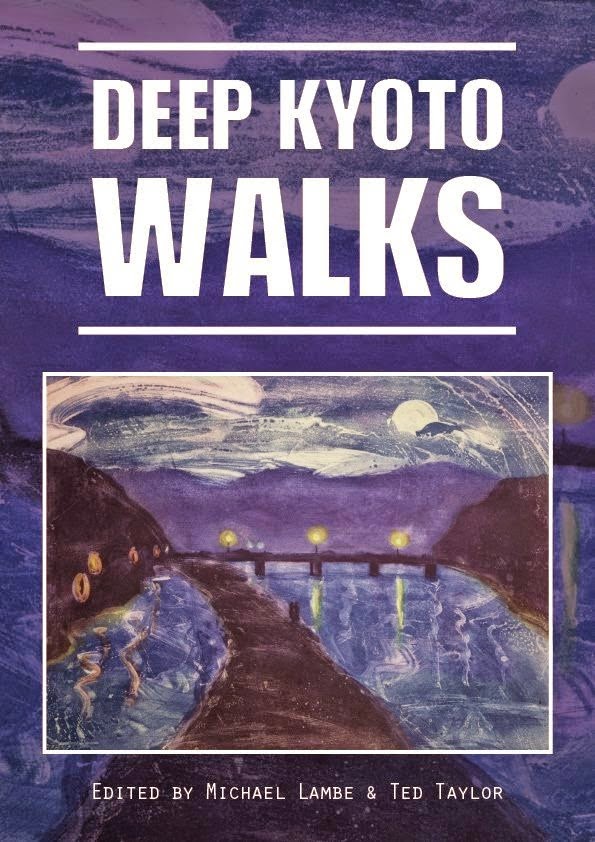After class I set off up the shopping arcade, looking for a place to have a quick coffee. Some folks are dashing around wearing blue happi, gearing up for some sort of festival. I like Osaka, there's so much life going on here, with little of the mothball smell that can often pervade Kyoto. I find a place that offers cups for 250 yen, so I grab a seat and get a cafe au lait. The decor hasn't changed in decades, and most of the clientele were probably my age when it was built. One middle-aged guy seems to be taking his elderly mother out for breakfast, and she looks thrilled. A greasy haired loner type sits across from me and disappears into a book. I too read awhile. I check my watch from time to time, then head back outside, figuring the Indian place must be open by now. It is. I order a curry and sit in front of a poster of some curvy actress in a sari, standing beside an armor-clad actor who is a dead ringer for David Hasselhoff. A shelf nearby sells candles in the shape of seated Buddhas. The perfect expression of tapas.
After lunch, I go underground and catch the train. Back in town, I find I still have an hour to kill. It's reasonably sunny, so I sit on the banks of the Kamo, and read abit. On my iPod, the Silver Jews start up a song called "Bring on the Clouds," and so beckoned, they come. It gets chilly quickly, but I read on. There are many walkers out today, going down one bank. and presumably up the other. One guy wearing Cat in the Hat gloves asks me in polite textbook English if I could please tell him the time. This used to happen back in the 'Nog, but this is the first time I've given an impromptu English lesson here in Kyoto. I shake him off soon enough and out on the river in front of me, a beautiful mallard shakes a tail feather of his own. I go back to my book, reading about the connection between Yoga and Buddhistic Shamanism, but I'm tired of reading about Yoga and Buddhistic Shamanism. Instead, I watch the river awhile. Some young guy descends a set of stone steps to the water's edge, and due to my reading material, for a moment my eyes are tricked into believing I'm actually in Varanasi, watching someone go down the ghat to do his daily ablutions.
I bike over to the studio, change clothes, get out my mat. I'm leading a workshop on Vinyasa jump-throughs, which is far off my usual yogic radar. I haven't even done Ashtanga for years, let alone teach it. Someday I'd love to get in front of a room full of Ashtangis and put them in an hour long Tadasana, just to watch them twitch. The trick to this workshop is that I'm teaching building blocks, rather than the jump-through itself. No one is expected to master this difficult pose in a single day anyway, so I'm basically giving them months of homework. Back in my English teaching days, I'd often get students who wanted me to teach them only"English for airports" or "English for shopping." Today is like this, but I'll be teaching them skills they can use in dozens of poses, and show them the importance of creativity and control rather than the usual overemphasis on muscular power. As the sign out front says, "Yoga for Life." (Though Andrew Sensei is right in joking, "Shouldn't it be 'Yoga for Death?'" Transcendence baby.)
I'm surprised to find that one of the attendees is a guy I met at the ashram in India two years ago. We chat awhile afterward, then Miki (who assisted me) and I bike quickly down to a different studio for a workshop on Nada, the yoga of sound. Ty Burhoe is leading it, and I know him since he did the music for Tias' DVD, plus a year ago he played tabla with Shen, who was my own teacher for a very short time. Ty's workshop is good, with a light humorous touch. For the second half, his drumming is the BGM for a vigorous Vinyasa class that I hadn't expected. I'm pretty pooped at the end. After a short break, he's joined by Sarod player Steve Oda for a mellow night of ragas. I'm too tired to sit up so I slump across a bolster, pointing my legs at the musicians, wiggling my toes in time to the music as if I'm conducting it. And drift into a minor samadhi that's all mine...
On the turntable: Chet Baker, "In Tokyo"
On the nighttable: David Chadwick, "Thank You and OK!"
On the reel table: "Round Midnight" (Tavernier, 1986)
